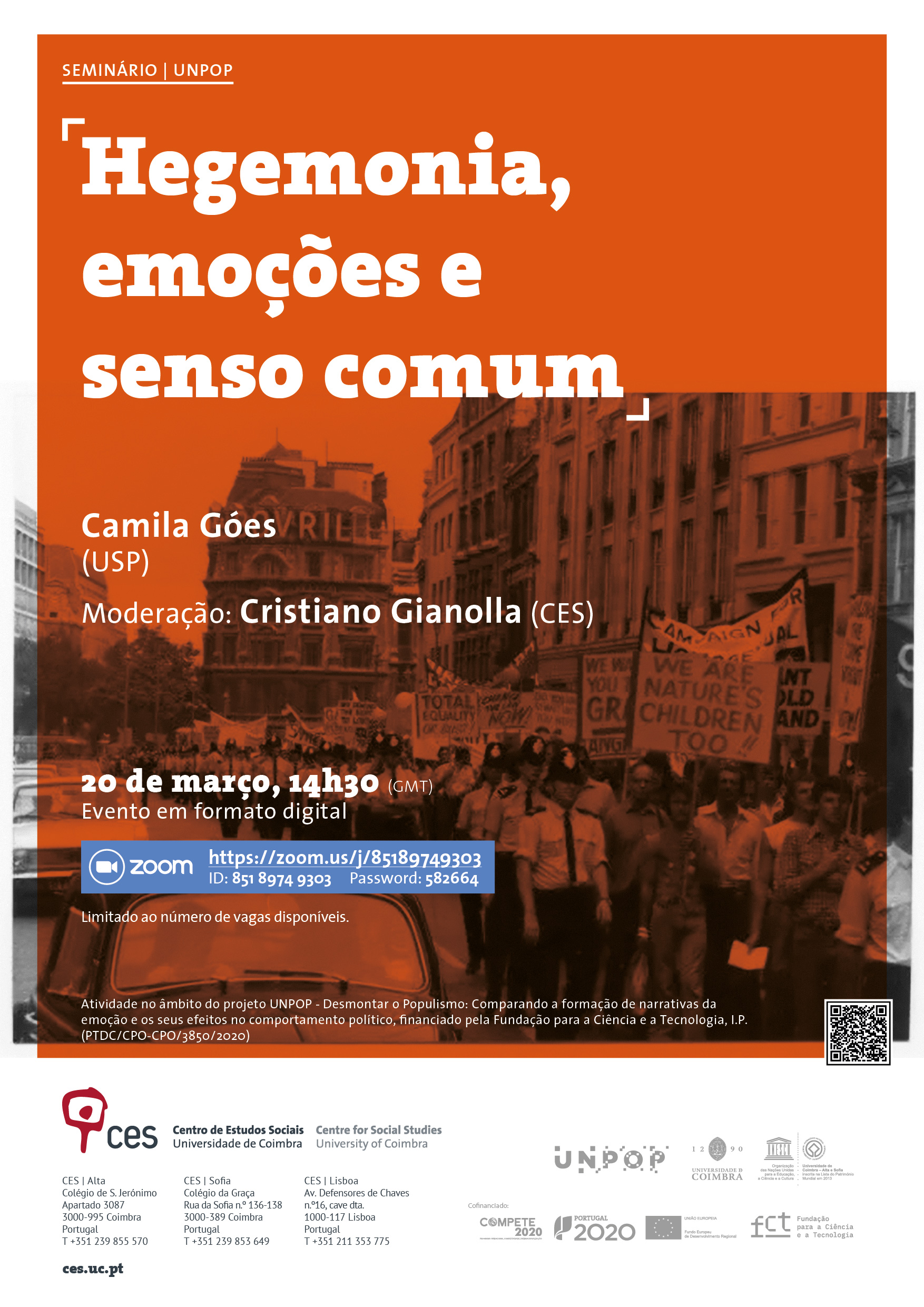Hegemony, emotions and common sense
Speaker:
Camila Goés (USP)
Moderator:
Cristiano Gianolla (CES-UC)
March 20, 2024, 14h30 (GMT Lisbon/London)
This activity will be provided through Zoom platform and does not require registration. Participation is limited to the number of places available > https://us02web.zoom.us/j/85189749303 | | ID: 851 8974 9303| Password: 582664
Framework
O lugar dos hábitos e dos afetos na manutenção de uma ordem social e política tem sido uma das linhas principais de discussão entre os que proclamam a “pós-hegemonia”, no sentido de destacar a novidade de suas elaborações frente a uma insuficiente versão da hegemonia identificada a uma genérica noção de “consenso”. Negligencia-se, nessa perspectiva, a elaboração feita por Antonio Gramsci para pensar a hegemonia em termos de uma expansiva “reforma intelectual e moral”, bem como suas elaborações sobre a organização do senso comum. Nesse sentido, o objetivo desta fala será perpassar alguns desses termas nos Cadernos do Cárcere em busca de uma maior contextualização e complexificação do olhar gramsciano sobre a política, com especial atenção ao papel assumido pelos afetos e hábitos.
This seminar is part of a series within the UNPOP project – UNpacking POPulism: Comparing the formation of emotion narratives and their effects on political behaviour, which aims to explore how narratives of emotion allow a deeper analysis of the way populist phenomena constitute and influence political behaviour.
Thus, the series of events developed throughout the project will address several issues involving the recent growth of populism, focusing on the role of emotions – both those considered negative such as anger and fear, and those considered positive such as hope and love – in political behaviour.
UNPOP is coordinated by Cristiano Gianolla and Lisete Mónico and is based at the Centre for Social Studies and by CINEICC – Center for Research in Neuropsychology and Cognitive and Behavioral Intervention of the University of Coimbra, and is funded by the Foundation for Science and Technology (PTDC/CPO-CPO/3850/2020).
Bio note
Camila Góes é graduada (2011) em Ciências Sociais pela Universidade Estadual de Campinas (Unicamp). Durante o mestrado (2015), realizado junto ao Programa de Pós-Graduação em Ciência Política da Universidade de São Paulo (USP), fez um estágio de pesquisa no Departamento de História da Universidade de Princeton (2013), com bolsa Fapesp. É autora do livro “Existe um pensamento político subalterno?” editado pela Alameda/ Fapesp em 2018. Durante o doutorado, financiado pela Fapesp e realizado junto ao Programa de Pós-Graduação em Ciência Política da Unicamp (2020), fez estágios de pesquisa em Roma, na Fondazione Istituto Gramsci (2016), e em Buenos Aires, no Centro de Documentación e Investigación de la Cultura de Izquierdas (2019). Sua tese de doutorado, “Gramsci e a dialética da tradução na América Latina”, foi premiada como Finalista do Concurso de Teses e Dissertações da Associação Nacional de Pós-Graduação e Pesquisa em Ciências Sociais (2021).
Como pesquisadora, atua desde 2009 no Pepol, “Laboratório de Pensamento Político” da Unicamp, e desde 2013 no Grupo de Pesquisa “Pensamento e Política no Brasil” da USP, ambos registrados junto ao Diretório de Pesquisas do CNPq. É pesquisadora de Pós-Doutorado no Departamento de Ciência Política da USP, com bolsa Fapesp, e integra o grupo de pesquisadores do Centro de Estudos dos Direitos da Cidadania (Cenedic) da USP, desde 2021. Tem experiência na área de Ciência Política, com ênfase em História do Pensamento Político, Circulação e a Tradução das ideias políticas, Marxismo e o pensamento de Antonio Gramsci. Camila é pesquisadora visitante no CES em 2023.
Bio notes
Ana Makhashvili is a doctoral researcher in Media and Communication Studies working at the collaborative research center “Affective Societies” at the Freie Universitat Berlin, Germany. From 2019 till 2023, she worked on the project ‘Journalism and the Order of Emotions’, where she analyzed the Twitter discourse around refuge and migration in Germany and now continues her research as part of the project “Contested Order of Emotions: (Anti-)Feminist Discourses on Social Media”. In her dissertation, she combines qualitative, quantitative, and automated methods to examine the role of emotions and affect in the formation of far-right publics on Twitter. Her latest publications include ‘Hijacking Solidarity: Affective Networking of Far-Right Publics on Twitter’ (Affective Formation of Publics. Places, Networks, and Media, 2023) and ‘Challenging Journalistic Authority in the Networked Affective Dynamics of #Chemnitz’ (with D. Medeiros and M. Lunenborg, Social Media + Society, 2022).
Maria Elena Indelicato (she, her, hers) is a CEEC FCT researcher at the Centre for Social Studies (CES), University of Coimbra and University of Münster Visiting Scholar at the Department of English. She is also an associate editor of the Journal of Intercultural Studies, and co-editor of the section ‘Anti-Racism/Mobilisations and Resistance’ of the forthcoming online Routledge Encyclopaedia of Race and Racism, and team member of the FCT group project UNPOP. Besides her monograph Australian New Migrants: International Students’ History of Affective Encounters with the Border (2018), Indelicato has published in feminist, critical race and cultural studies journals such as Outskirts: Feminisms along the Edge, Critical Race and Whiteness Studies e-Journal, Chinese Cinemas, Inter-Asia Cultural Studies, Paedagogica Historica, Transnational Cinemas, Feminist Review, Postcolonial Studies, and Interventions. International Journal of Postcolonial Studies besides several chapters in edited books on migration, settler colonialism, and Chinese cinemas.



